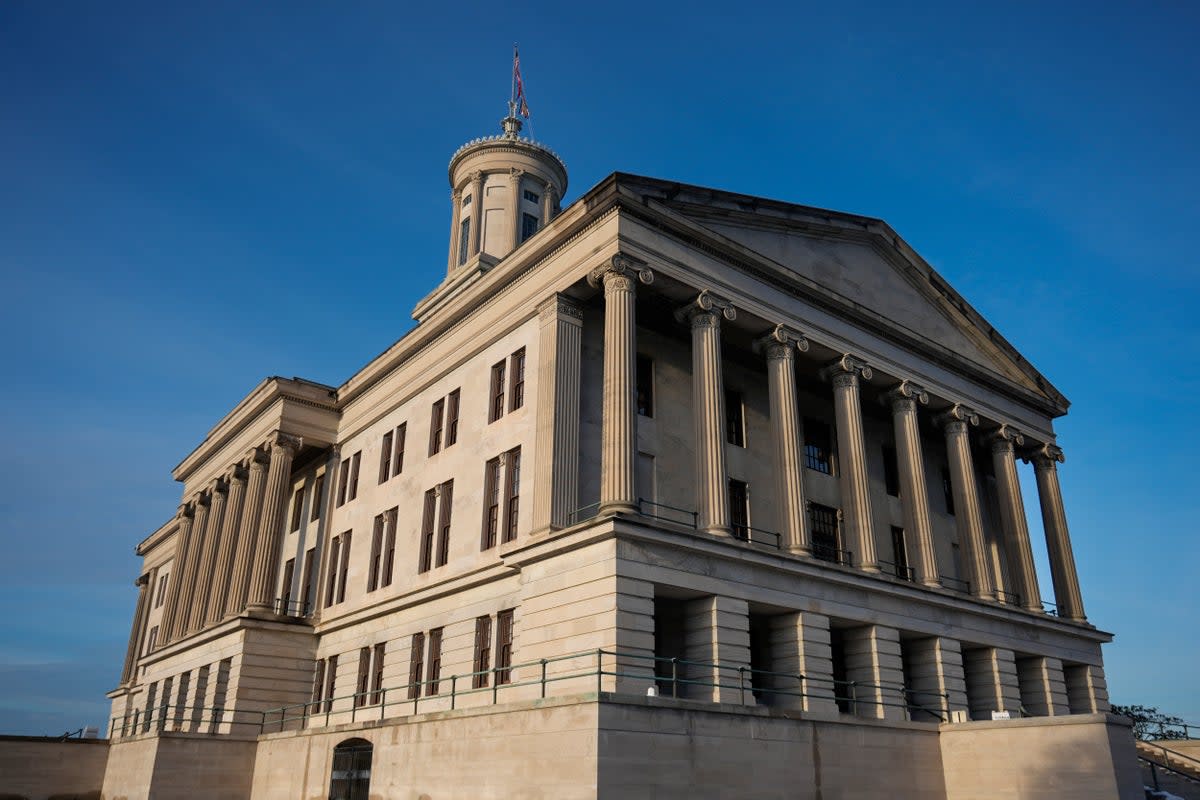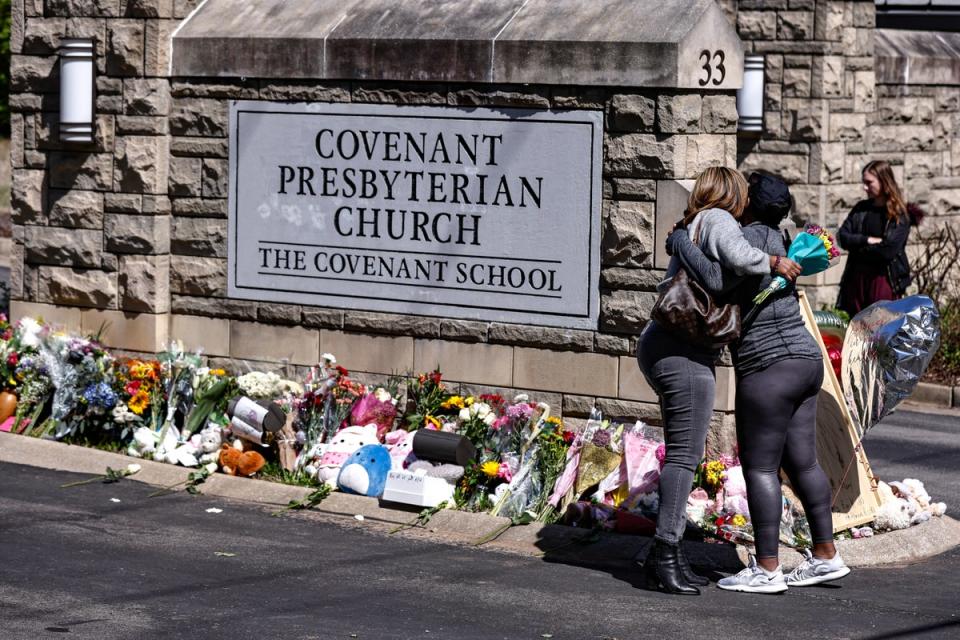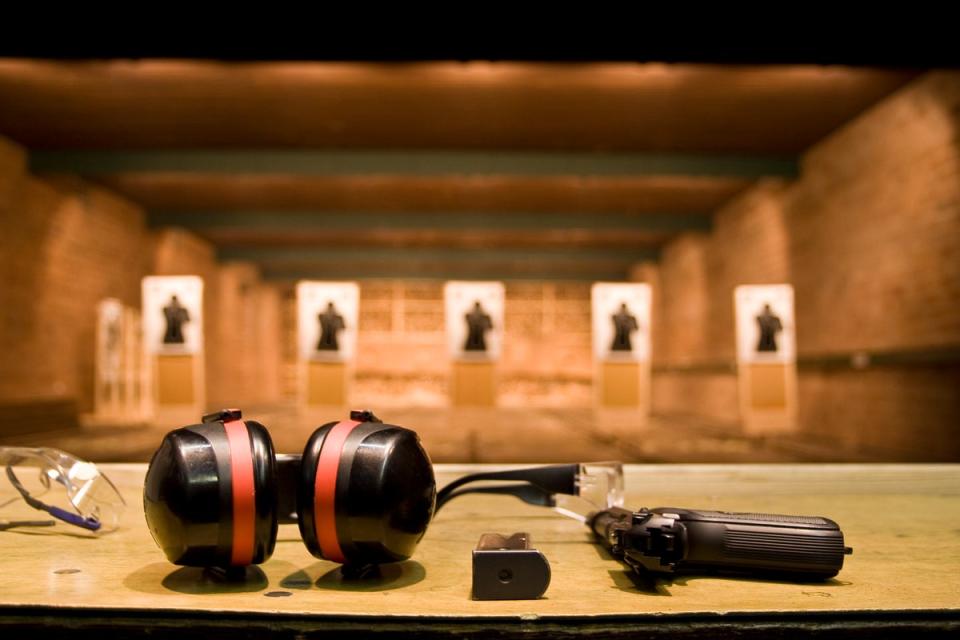Tennessee teacher and gun safety advocates slam move to arm school staff: ‘We don’t go into teaching to kill someone’

Cathy Barnett, a retired Tennessee teacher, has seen the job of an educator in the US change dramatically in the wake of bloody school shooting after bloody school shooting.
Following each tragedy across the country, the gun lobby has pushed the notion that armed teachers in the classroom could have somehow prevented weapons of war being turned on children and teachers.
“We don’t go into the profession to learn to shoot and to kill someone,” she told The Independent.
But that soon could be part of the job, if a proposed bill allowing Tennessee public school teachers to carry firearms on school grounds becomes a law.
The GOP-controlled Tennessee Senate passed the controversial measure, sending the bill to the state House. The chamber has yet to announce when it would take up the bill.
The bill arrived just a year after a former Covenant School student walked into the private school and opened fire, causing a mass shooting that left three students and three school staff members dead.
Ms Barnett, a volunteer for Moms Demand Action, called the state Senate bill “terrible.”
The 74-year-old was an art teacher for 22 years, meaning she taught through the Columbine massacre until she retired just before the 2012 Sandy Hook mass shooting, a tragedy that outranked Columbine to become the deadliest K-12 school shooting in US history.
“Our world has changed so much,” she said, adding that when Columbine happened, it felt very “removed” and distant from her schools in Tennessee. But with Sandy Hook, she thought, “If that can happen in an elementary school,” it can happen anywhere.
It has happened everywhere, data shows. Since 1999, roughly 360,000 students have endured school shootings.
As school shootings have been on an alarming uptick year over year, state leaders are scrambling to find solutions to prevent such tragedies. However, Ms Barnett and other gun safety advocates argue they are going about it in the wrong way.
Misinformed approach
Ms Barnett and gun safety advocates said that although they believe the state’s legislature is trying to make schools safer, they aren’t looking in the right places.
“They’re not looking at the evidence, and they’re not listening to anyone, their constituents, the parents,” Ms Barnett said. She and other activists have called elected officials, testified at hearings, and even protested. “They just turn their heads, they don’t listen.”
There is “no evidence that arming teachers will keep children safe from gun violence,” Kris Brown, President of Brady United Against Gun Violence, told The Independent in a statement.
At the Covenant School shooting, for example, “reports showed that multiple teachers were armed that day, yet that was not enough to stop six children and school employees from being murdered.”
Ms Brown called introducing firearms into schools “ludicrous”, adding that at best, it increases the chances of “students and staff feeling unsafe, and at worst, unintentional discharge or a teacher losing control of their firearm in a classroom of children.”
It seems like introducing weapons into schools filled with children isn’t the best solution generally, but especially in Tennessee, which has a staggering firearm-related child death rate.

In Tennessee, one in four deaths of children aged 17 and under were due to a firearm, according to a 2023 report by the Tennessee Commission on Children and Youth.
Dustin Williamson, regional legal director at gun safety group Everytown, underscored this misconception, telling The Independent that he believes “some legislators who already are of the mindset that more guns make people safer” are focusing “strictly at what happens when a gun gets in school” rather than relying on “proven solutions” that could stop the guns from entering the school in the first place.
One solution to address gun violence in schools, that doesn’t involve arming teachers, is enacting extreme risk laws, Mr Williamson said. These laws allow family members and members of law enforcement to temporarily remove firearms from someone who is at serious risk of harming themselves or others.
These laws provide an opportunity for a dangerous person to be stopped long before they enter a school with a gun.
Only 21 states have adopted these laws — Tennessee is not one of them.
Joining the armed teachers club
If the bill became a law, Tennessee would join 16 states that have already enacted similar measures.
Brynn Beecham lives in one of those states: Texas.
Ms Beecham, a Students Demand Action and an 11th-grade student in Dallas said her school has two to three active shooter lockdown drills each semester, given the prevalence of gun violence in schools.
Given the increased frequency of these mass shootings, the 17-year-old said the anxiety around a potential shooting has “upsettingly been a thought in the back of my head a lot of the times when I go to pretty populated areas or concerts or even school every day.”

She said her school resource officer has a gun, but teachers at her high school aren’t armed. Asked whether an armed presence on school grounds eases her anxiety, she said, “I would rather have a no-gun campus because I think having that scares…me and my friends.” Ms Beecham said, “We don’t know if [a gun] could get into the wrong hands.”
Nearby districts, however, do have armed teachers, she said. “We see other schools doing it, and we worry that maybe our school will be a school to do it” as well, the high school junior added. Having “weapons on campus distracts us as students with other worries that we shouldn’t have to be thinking about.”
Kept in the dark
The bill mentions a litany of requirements for a school staff member to possess a concealed handgun on school property, like having a handgun permit and completing a minimum of 40 hours of training “specific to school policing” every year.
This training aside, there’s evidence that shows “that our teachers can’t, and in a moment of extreme duress, be expected to act the same way that a specially trained law enforcement officer would be,” Mr Williamson said.
There seems to be another problem; the legislation lacks a storage requirement.
Ms Barnett asked, “Is it required to be put it in a safe? Or can you just put it in your drawer in your [class]room…where a child could get access to it?”
She emphasised just how easy it would be for a student to grab it from a teacher’s desk if the teacher’s attention was distracted by another student: “I don’t have eyes in the back of my head.”

To further underscore the dangers of having no storage requirement, gun safety group Giffords Law Center tracked more than 100 incidents of accidents resulting from mishandled guns in schools over five years.
Mr Williamson clarified that even if the bill did mention that safety guard, Everytown wouldn’t support it.
On top of this, the bill lacks transparency about an aspect that parents are desperate to know: which teachers would be armed.
This legislation provides “confidentiality requirements” regarding school employees who may carry a concealed handgun on school property.
Ms Barnett said that her daughter who lives in Tennessee told her that she would remove her kids from school if she didn’t know which teachers were armed.
More responsibility, no immunity
Gun safety advocates have also raised eyebrows over the implicit liability that the bill suggests.
This bill would equip teachers with a “dual responsibility” of caring for children and being prepared to respond to an armed threat, Mr Williamson said.
Such a response would come without any immunity from lawsuits that could arise as a result of a reaction to a shooting — or an accident, the language of the bill states.
However, the bill explicitly carves out that law enforcement agencies are “immune from claims for monetary damages that arise solely from, or that are related to, a faculty or staff member’s use of, or failure to use a handgun.”
Ms Barnett similarly remarked on the mental shift that comes with the bill. Switching from being a “nurturing teacher” to being prepared to take on an active shooter, “just doesn't work,” the 74-year-old said.
A typical day as a teacher could require a variety of tasks, like trying to stop a nosebleed, breaking up a fight, or helping after a child falls on the playground, she said.
“There’s so many things that go on all day that you have to deal with,” Ms Barnett said. “And then on top of that, you expect the teacher to be able to use a gun?”
Ms Brown echoed this, saying, “America’s educators are already overburdened and under-resourced, and adding the enormous responsibility of managing a firearm in a classroom would distract from their vital responsibility: educating our children.”
“The bill itself contains an immunity clause protecting local education agencies from liability for potential misuse of these firearms. It’s as if the legislators anticipate the disaster this bill could cause but care more about protecting guns than children,” she added.

